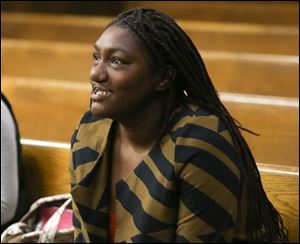
To the editor: What's your vision for a safer Toledo?
5/15/2018
Ruth Leonard is a spokesperson with the Community Solidarity Response Network of Toledo.
In June, 2017 the Department of Justice announced it would include Toledo in its National Public Safety Partnership, a program as obscure in purpose as it was in execution. But the intentions of the Jeff Sessions-led DOJ have been crystal clear: to return to outdated, aggressive policing practices.
Despite opposition from the Community Solidarity Response Network, the city of Toledo accepted the partnership without much understanding of what that would entail.
Click here to submit a letter to the editor
For the better part of this year, Toledo police and the Department of Justice have collected data on which neighborhoods are crime “hot spots.” This includes data such as the number of 911 calls from an area, the number of arrests there, and documented acts of violence, along with socioeconomic factors such as employment, access to health care, and poverty. Unfortunately, this practice often leads to targeted deployment of law enforcement to communities of color, which leads to race profiling and more black people in jail and prison. One piece of data not factored into the hot-spot identification is the violent crimes committed by police officers.
The second year of the program is set to begin in October. There will be an increased police presence, which will likely be accompanied by increased arrests. There is no indication this will lead to a decrease in actual violence, however.
Officials who support the partnership talk about programs to address the underlying issues that cause violent crime — poverty, lack of jobs and opportunities, no access to social service safety nets like mental health and addiction treatment, and better schools. But with an attorney general who seems to favor tough-on-crime tactics, a failed war on drugs, private prisons, and aggressive immigration enforcement, we have our doubts.
Community Solidarity Response Network and the American Civil Liberties Union believe police work must be informed by the community’s wants and needs. Therefore CSRN and the ACLU will host a community conversation at 6 p.m., Wednesday, May 16, at the Frederick Douglass Center.
We want our neighborhoods to be safe. But “safe” can mean many different things to many different people. And too often, governments have used the idea of safety as a way to take away people’s rights, particularly in communities of color and low-income communities. So, we want to hear from you. What is your vision for a safer Toledo?
RUTH LEONARD
Central City
Editor’s note: Ruth Leonard is a spokesperson with the Community Solidarity Response Network of Toledo.